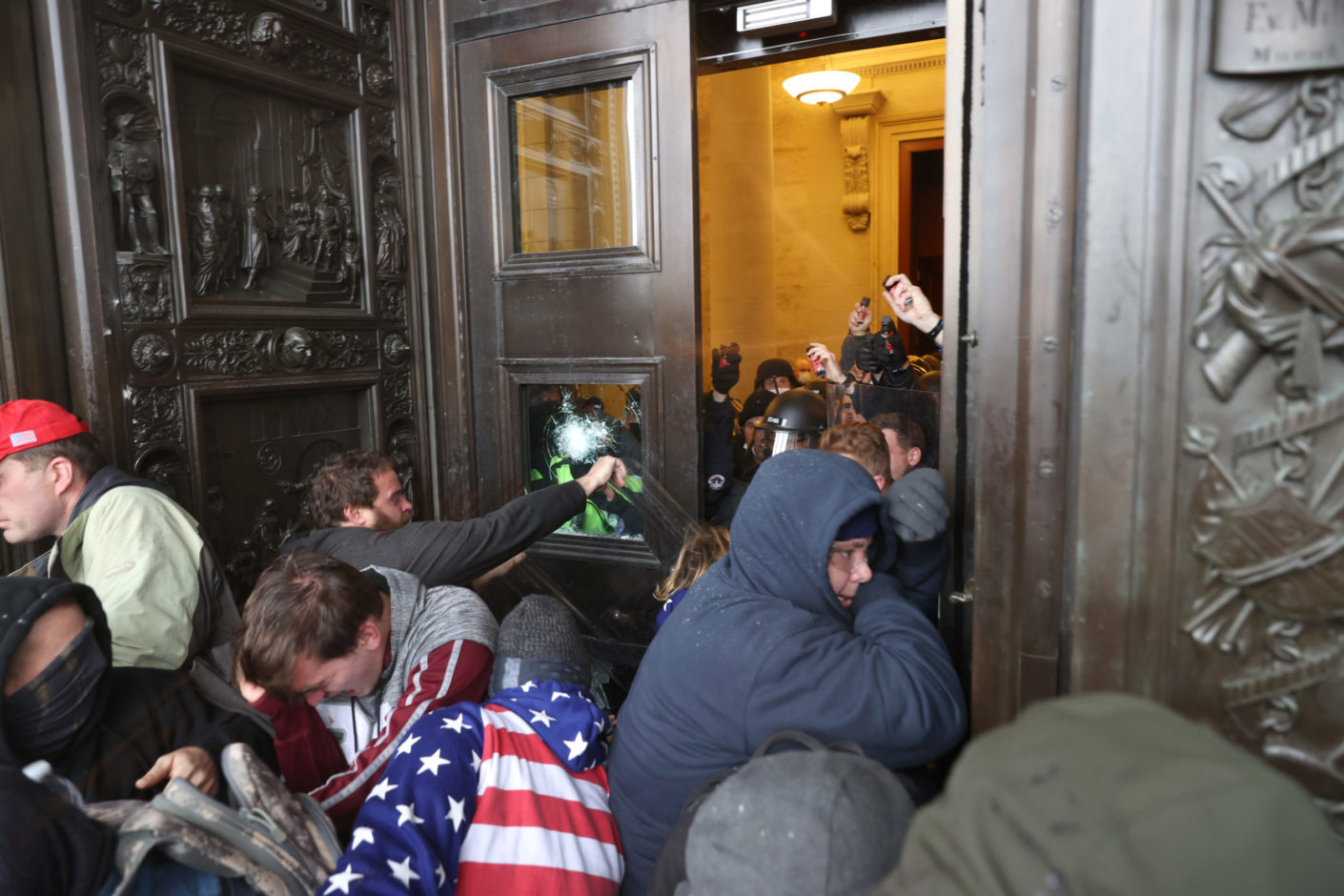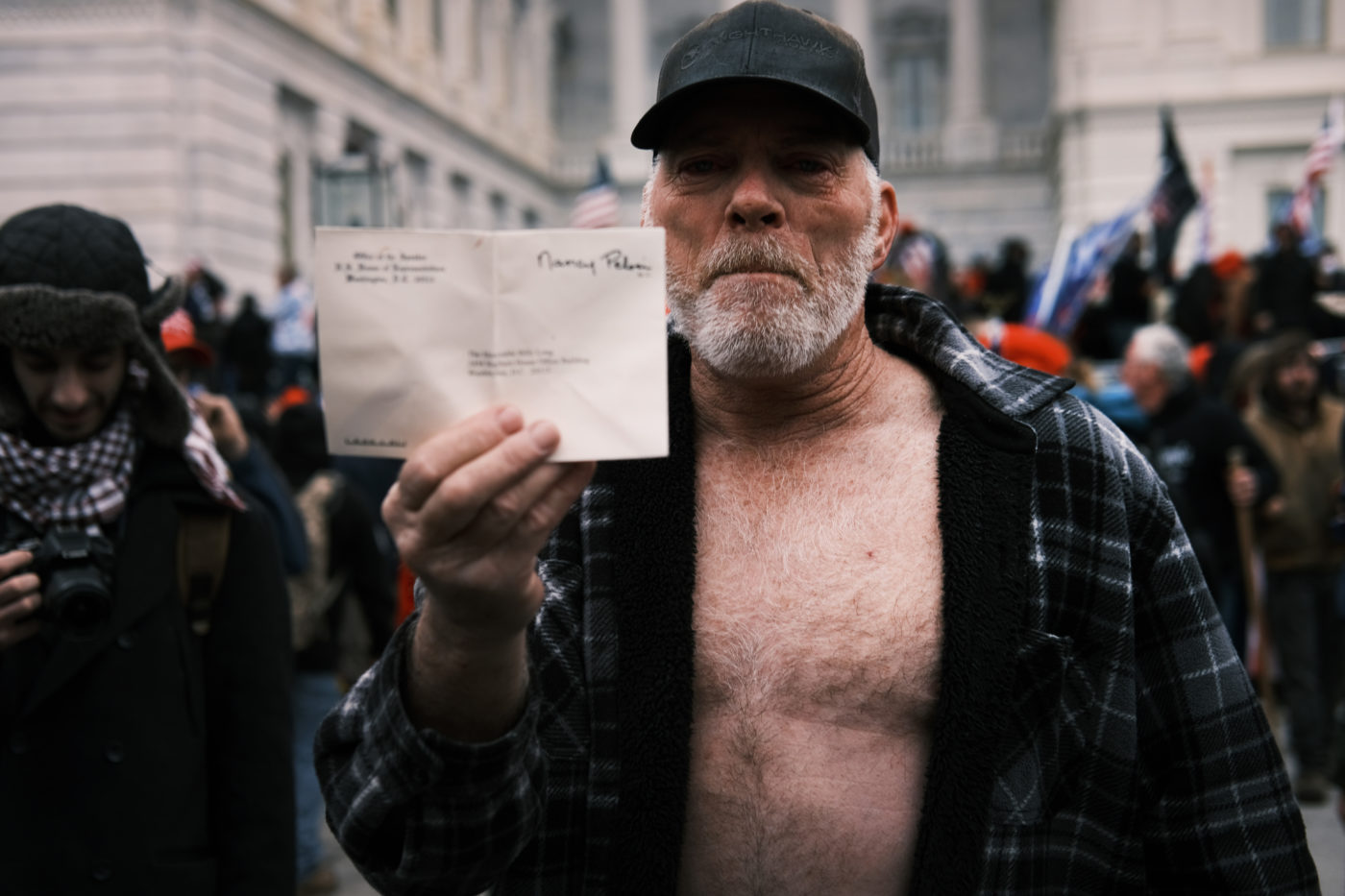

A self-described white nationalist occupied Speaker Pelosi’s desk on Wednesday, after pro-Trump rioters breached security at the Capitol Building. As reports came in of armed conspiracy theorists roaming the Capitol, I remembered my one visit to that room over a decade ago, when I was given a quick tour of the Speaker’s suite by a House staffer.
My Sludge co-founder Donald and I were developing the congressional transparency website OpenCongress then, and for a while the Democratic leadership would make concessions to the wish lists of open-government advocates and buy themselves another 12 months of delay in actually taking action to improve congressional transparency. These concessions usually involved attending some meetings down in D.C. That afternoon, a few congressional reformers and I surveyed the Hill from the Speaker’s office balcony, near the desk where deals got cut. This week, the pro-Trump rioters stormed that room with zip ties and firearms.
I’d often had chances to think about that balcony since, while reporting on House Democratic leadership’s pliant strategy and criticizing Pelosi’s impossible passivity. That tour was on March 5, 2009, still the start of a short-lived Democratic trifecta in the federal government, less than half a year after Lehman Brothers collapsed and the Great Recession entered an acute phase. The House schedule that day shows the 111th Congress considered a bill on mortgage foreclosures.
The Democratic Party’s response in the first half of 2009 to the Great Recession—the wave of unemployment, home foreclosures, bankruptcies it caused—would constrain national politics for the next decade. The Obama administration’s decisions on economic priorities were shaped by powerful corporate forces, especially the financial industry, and its resulting inadequacies and carelessness fed mass resentment toward Washington. Nearly 12 years later, MAGA die-hards whose protests were promoted by many of the Tea Party movement’s funders were lounging at Pelosi’s desk, with a white nationalist nicknamed “Bigo” stealing a piece of her mail as a trophy and showing it off for the cameras.

The foundation for the rise of the right-wing Tea Party was laid by the Bush administration’s design of the financial bailouts, including the Troubled Asset Relief Program (TARP) that passed Congress in October of 2008. Then-Treasury Secretary Hank Paulson, after an inept first attempt, succeeded in getting $700 billion in virtually-no-strings public funds to bail out Wall Street firms that had become insolvent due to mismanagement and fraudulent lending, yet had been allowed to become too big to fail. To secure support of skeptical Democrats for bailing out reckless giants like Goldman Sachs and Citigroup, Paulson added Section 109, promising to scoop up troubled mortgages and give much-needed relief to homeowners. But President Obama’s Treasury Secretary Tim Geithner and the Big Banks simply dropped their commitment to modify mortgages for Main St. Democrats were aware of the program’s obfuscation and corporate tilt: Rep. David Scott said at a December 2008 hearing, “We’ve been lied to.” Only $4 billion of the planned $50 billion reached homeowner aid.
The incoming Obama administration, in the days before his swearing-in, did not see fit to overhaul TARP before lobbying Congress to release the second tranche of $350 billion in mid-January 2009. Populist fury understandably grew as people saw finance executives haul in tens of millions of dollars in compensation while the Home Affordable Modification Program (HAMP) failed to reach more than a fraction of its intended recipients. In April 2009, the Congressional Oversight Panel went public that it was being ignored by Geithner and Paulson, that they were “not a priority” for the Treasury Department. Years later, experts found that the enormous expense of TARP just broke even, with tremendous costs to public trust as Big Banks only got bigger.
The next year, progressives gathered at the Netroots Nation conference in Las Vegas held a panel on the “Forgotten Foreclosure Crisis” with Sen. Jeff Merkley (D-Ore.) and TARP oversight panel chair Elizabeth Warren. Congress, meanwhile, was typically laggard in extending vital unemployment benefits, as people swarmed to sites like OpenCongress to learn about the status of federal relief efforts. Unemployment figures slowly improved, but only because millions of workers gave up on their past lives and dropped out of the workforce entirely. In OpenCongress’ comment forums, we saw the momentum building around Tea Party resentment, as well as the drive for corporate accountability that later prompted the Occupy movement, but triage measures weren’t applied before the midterms. Obama’s Treasury Department never sanctioned a mortgage company for HAMP violations and there were virtually no prosecutions of finance industry executives responsible, with fines and settlements largely paid by shareholders, not by bankers.
As of September 2010, before the midterm elections, some $80 million in negative ads had gone out against the elite bailout and the politicians who voted for it. The Tea Party freshmen reps elected on a populist wave did not end up breaking up the Big Banks and curbing the influence of the finance lobby, but they did enforce austerity over social programs and productive government spending while slashing taxes for wealthy taxpayers and large corporations.
The Tea Party movement that took the House in 2010 and helped Republicans retake the Senate in 2014 dovetailed with the under-the-radar influence campaigns of right-wing billionaires like the Koch brothers and the anti-regulatory interests of the oil and tobacco industries. The Koch political network harnessed the Tea Party’s anger at government spending and flaws of Obamacare to push model legislation through organizations like the American Legislative Exchange Council (ALEC) and FreedomWorks. Over the past decade, the Koch network has spent over $15 million defending 13 GOP senators who were planning to attempt to stop this week’s Electoral College certification. Some 20 large corporations directly contributed $16 million to Republican lawmakers who sought to overturn the presidential election results and install Trump. The Republican state-level gerrymandering push of 2010 was bankrolled with $30 million donated in part from corporate behemoths AT&T, Pfizer, and Wal-Mart. Republican senators sought to fundraise off the protests while they were happening.
Compared with the push for greater public accountability in 2009, social media has made it easier for activists to put out calls for the Biden-Harris administration to avoid the shortcomings of Obama’s first year and capitalize on their new trifecta in the crucial first months in power. But three of the top figures from 2009’s fateful months of inaction are again in power: Biden, Pelosi, and new Senate Majority Leader Chuck Schumer. As a party leader, Barack Obama has not publicly reckoned with how his administration’s response to the last crisis provided a populist cover story for the Tea Party funders, which fomented Trumpism and conservative media, and promoted this year’s state “liberate” protests against public health orders during the coronavirus pandemic.
Incoming President Biden prevailed in the Democratic primary with the help of a Big Money super PAC and wealthy bundlers with extensive corporate interests, and his Inauguration threw open the doors to more corporate donors, while his nominees come with glaring conflicts of interest in their past consulting work and private equity partnerships. The work of the months ahead to pass greater pandemic relief will need to press ahead at the same time as defensive lobbying by corporate behemoths like Amazon and Facebook, who kept up their relationships with Democratic leadership. To demonstrate that the public interest is again the first priority, government watchdogs will have to continually remind the Biden administration and the new Congress what happened the last time the bankers called the shots.

Read more from Sludge:
Biden’s State Department Nominee Is a Walking, Talking Conflict of Interest
Corporate Lobbyist Bailout: DENIED
GOP Reps Who Voted Against $2,000 Checks Received Millions in COVID Bailout Funds
For more congressional watchdogging, check out past editions of the Sludge Report, and get our email newsletter.
